The troubling obsession with the ‘sexy psychopath’
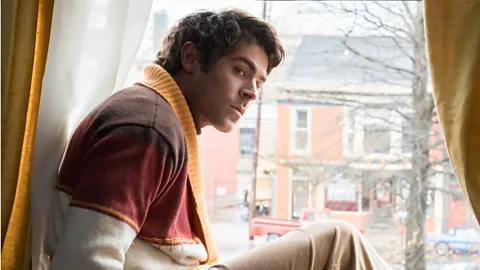 Netflix/ Brian Douglas 2017
Netflix/ Brian Douglas 2017A new Ted Bundy film is the latest in a wave of works to focus on handsome men guilty of heinous acts. Are these exploring toxic masculinity – or fetishizing it, asks Hugh Montgomery.
You shouldn’t really judge a film by its trailer. But few have inspired quite as much premature outrage as the one released for Extremely Wicked, Shockingly Evil and Vile, the new biopic about mass murderer Ted Bundy starring Zac Efron. When the first trailer arrived back in January, it caused widespread consternation for the way it seemed to glamorise Bundy, with its rock 'n' roll music and natty title cards suggesting the tale of one of the US’s most notorious serial killers had been turned into a kind of Tarantinoesque romp. Under fire, director Joe Berlinger was at pains to disassociate himself from the “false impression” the trailer gave. “I want to assure those concerned that our film in no way glorifies Bundy or his atrocious acts,” he said in a statement to BuzzFeed News, responding to the criticism.
More like this
Was the trailer really so deceptive though? Now the film is on worldwide release (on Netflix in the US and other territories, and Sky Cinema in the UK) audiences can judge for themselves. But even if you watch it very much aware of Bundy’s crimes, the film makes it easy to forget that this was a man who raped and murdered at least 30 women across the US. It is ostensibly told from the point of view of his deluded girlfriend Liz Kloepfer (played by Lily Collins) who, for a significant while after he came into the orbit of the police, protested his innocence – a partial perspective which ultimately renders him more palatable than he has any right to be for much of the film’s running time. That palatability is only increased by its stylised packaging, from the seductive '60s and '70s soundtrack to the way it captures Efron in enraptured slow-motion - in the scene, for example, which recreates Bundy’s escape from an Aspen courthouse during a pre-trial hearing.
And then, most crucially of all, there is the central casting. Discussions of Bundy have always made a point of his relative physical attractiveness. But putting Efron, one of the world’s most conspicuous male sex symbols, in the role? It feels like a considerable – and calculated – exaggeration.
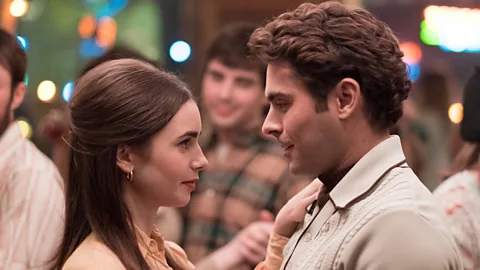 Netflix/ Brian Douglas 2017
Netflix/ Brian Douglas 2017But if Extremely Wicked, Shockingly Evil and Vile is guilty of fetishising its depraved lead, then it is arguably not in isolation. Popular culture in 2019 is heaving with tales of male killers, abs, and psychopaths – and more often than not, these paragons of toxic masculinity are played by blue-chip Hollywood heartthrobs. Two of Netflix’s most talked-about shows of recent times have been You, a drama about a seemingly ‘nice guy’ stalker and killer played by former Gossip Girl pin-up Penn Badgley; and Dirty John, based on the true-crime podcast about serial con artist and ab John Meehan. It stars the hunky Australian actor Eric Bana, who made audiences swoon in The Time Traveller’s Wife and Troy, among others. Meanwhile, next month sees the hugely-anticipated return of the starry and soapy HBO drama Big Little Lies – a show whose first series hinged around a much-discussed domestic abuse plotline featuring Scandinavian dreamboat Alexander Skarsgård.
And while Bundy has been the subject of both a feature film and a four-part Netflix documentary series in recent months, another serial killer known for his charm and allure is also having a moment. Charles Manson, who notoriously gathered a cult of devoted young women around him, is played by Matt Smith in new biopic Charlie Says, while the Manson murders are set to be a key component of Quentin Tarantino’s latest film Once Upon a Time in Hollywood.
Stories for the #Metoo age?
Should we be disturbed by this seemingly endless fascination with what one might crudely term the ‘sexy psychopath’? On the one hand, there are valid reasons for wanting to address toxic masculinity – and the fact that it may not come in an obviously toxic package. Meanwhile some of these works, as well as dealing with violent men, reflect the wider cultural drive, in the light of #MeToo, to centre on the perspectives of female victims. “I think there’s more and more of a desire to understand women’s experience and to back away from victim blaming,” says Jean Murley, an associate professor of English at Queensborough Community College in New York and author of The Rise of True Crime: 20th Century Murder and American Popular Culture. “In the past, we said ‘how could she date this person? Didn’t she know?’...[there’s a] moving away from [that] into looking at how easily anybody can be taken in by this kind of man.”
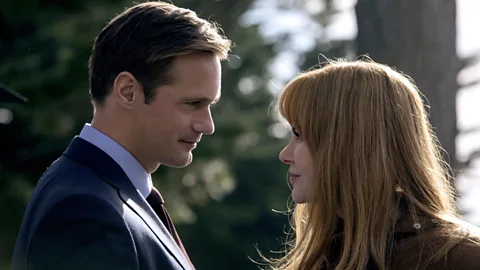 HBO
HBOBut, on the other hand, you could argue that many of the films and shows are themselves in thrall to these men – trading on and exploiting their aberrant charisma for entertainment, rather than anything more enlightening. You, for example, lavishes all of its attention on its stalker anti-hero, going so far as to furnish him with his own alluringly caustic voiceover. By comparison, his target, Beck, is a sorely underwritten figure; a few episodes in, she is jarringly, and very briefly, given her own inner monologue, which only serves to highlight how little the show cares about her point of view otherwise. In the case of Extremely Wicked, Shockingly Evil and Vile, setting up the Bundy story from his girlfriend Kloepfer’s perspective is a disingenuous conceit given, again, how cursorily drawn a character she is, and how much more interested the script is in Bundy’s twisted charisma.
Glossing over abuse
Beyond characterisation, there is also the wider issue of how these narratives of male violence and psychopathy are packaged. Dirty John and Big Little Lies are both, as much as anything else, ‘lifestyle porn’, flaunting beautiful people in beautiful houses – and that seductive quality cannot help but adulterate their dark storylines. “If you wanted to make that without it being glossy, you wouldn’t get it funded,” says Bridget Lawless, an author, screenwriter and vocal critic of the proliferation of gendered violence in fiction, who last year founded the Staunch Book Prize, awarded to novels in which no woman is beaten, stalked, sexually exploited, raped or murdered. “You can’t really pretend it isn’t anything but cynical. It’s just a business.”
The way in which male psychopaths and abs continue to be glamorised and fetishised by popular culture is arguably reflected in viewers’ responses to these films and TV shows. From the moment the first pictures of Efron in character in Extremely Wicked… were released, the internet has been abuzz with talk of the ‘hot Ted Bundy’ movie. What’s ironic is that the film shows how Bundy became a deviant pin-up during his trial, the first to be televised nationally in the US, attracting scores of female groupies to court – and yet it seems to be enabling him to receive equivalent attention all over again. “It’s a vicious loop that does nothing to encourage a better understanding of how these crimes occur [or] who these people are,” says leading criminologist Professor David Wilson.
Similarly, some of the lustful responses to Netflix’s Bundy documentary series resulted in the streaming service using its Twitter in January to remind its subscribers that “there are literally THOUSANDS of hot men on the service – almost all of whom are not convicted serial murderers.” That same month, You star Badgley went viral with a series of tweets dressing down fans who were pining after his character.
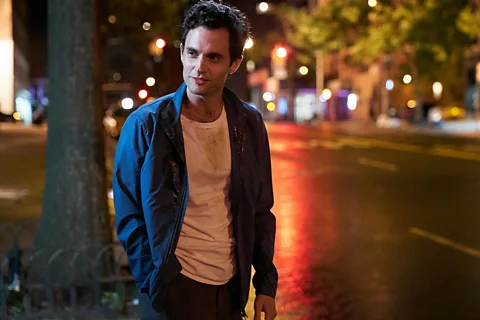 Netflix
NetflixHowever it’s difficult to see such interventions as anything but hypocritical. (Indeed, Badgley later itted that his response “was partly disingenuous because the whole point is [Joe] is meant to garner a conflicted reaction.”) In such cases, Netflix are a “victim of their own success,” says Lawless. “What did they want to happen? [With] this hunky guy in You, you are being seduced as a viewer just as the characters in it are. And then they go ‘oh crikey’ and try to wheel it back, but they’ve actually succeeded.”
Lecter’s legacy
Wilson traces the romanticisation of male serial killers back to one fictional character in particular: author Thomas Harris’s creation Hannibal Lecter. That Chianti-swilling, opera-loving aesthete most iconically played by Anthony Hopkins, really proffered the idea of the murderer as a perversely aspirational figure, But, as Wilson points out, readers and audiences were also led to mistakenly believe Lecter was an authentic representation of a serial killer, because of the way the books were sold on the research that Harris had done, including visits to the FBI’s behavioural science unit.
Wilson has spent his career busting the myths propagated by those like Harris, in books including this year’s My Life with Murderers: Behind Bars with the World’s Most Violent Men: chiefly the false perception “that [you’re] dealing with a super-predator that’s incredibly intelligent and is going to be quoting Nietzsche or discussing fine foods or Florentine architecture... actually serial killers are very ordinary and banal, and will usually not discuss their offending at all,” he says.
When it comes to true-crime stories, meanwhile, Wilson says it’s clear that there is a hierarchy of killers that the entertainment industry are interested in. Bundy has been a repeated source of fascination – there have been numerous films and books directly about him, and many more inspired by him and his actions, including Harris’s Hannibal Lecter series and Bret Easton Ellis’s American Psycho. By contrast, the body of work focusing on the late Dennis Nilsen – the Scottish civil servant who murdered at least 15 young men in London in the late 1970s and '80s, and who Wilson came into with early in his career – is minimal.
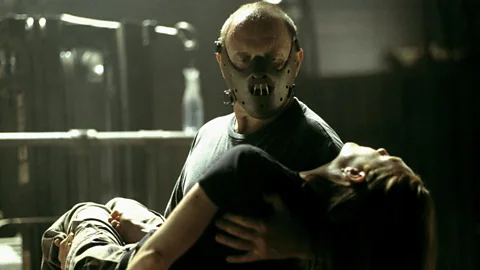 Universal/Alamy
Universal/AlamyWilson links that both to Nilsen’s appearance – which he has described in his work as that of a “weedy geography teacher” – and the gender and sexuality of his victims. “It’s not appealing to talk about a man who used society’s homophobia to continue to kill young men, many of whom were gay,” as he puts it. “We’re much more interested in a young attractive man killing young attractive women. What we don’t talk about is the misogyny that allows [Bundy] to continually become a source of our gaze.”
Murley agrees that there remains an evident bias at play in the heinous people and acts we depict, or choose to reflect upon. “I’m not a criminologist but I know that most victims are not beautiful young women. The biggest demographic of victims are young men of colour in this country. And those stories are never told. Nobody is interested in making those stories or buying them.” However, in general, she has faith in the increasingly sophisticated critical discussions around the portrayal of violence, and violent men. “We’re seeing attention [being paid] to the issues that are inherent in these representations,” she says, “and the ways that these stories are beings told. And I really welcome that, because we need to be more critical of these representations, and to tell more sides of these stories.”
Certainly, Extremely Wicked, Shockingly Evil and Vile has received enough pushback that, in future, one can but hope that filmmakers looking to compel audiences with yet another charismatic male psychopath figure may think more carefully about their choices.
Love TV? BBC Culture’s TV fans on Facebook, a community for television fanatics all over the world.
If you would like to comment on this story or anything else you have seen on BBC Culture, head over to our Facebook page or message us on Twitter.
And if you liked this story, sign up for the weekly bbc.com features newsletter, called “If You Only Read 6 Things This Week”. A handpicked selection of stories from BBC Future, Culture, Capital and Travel, delivered to your inbox every Friday.
